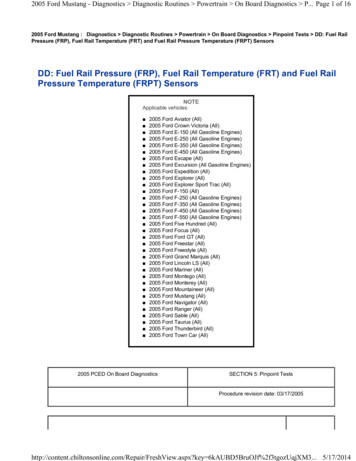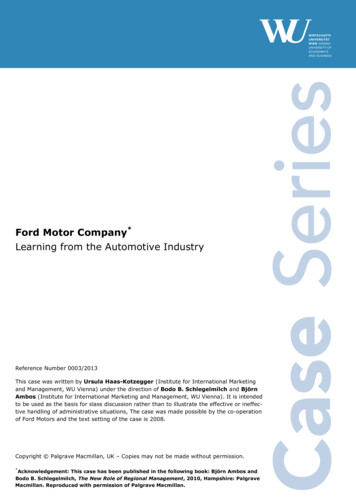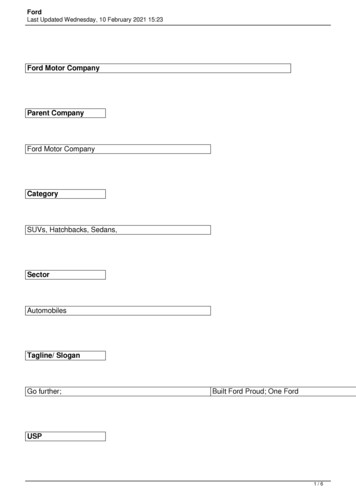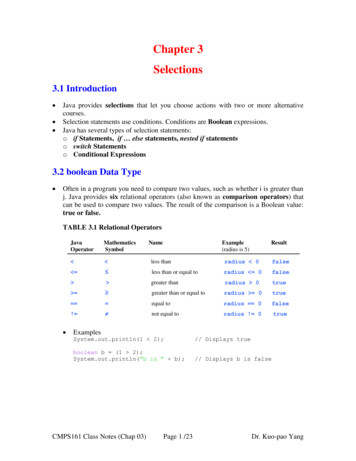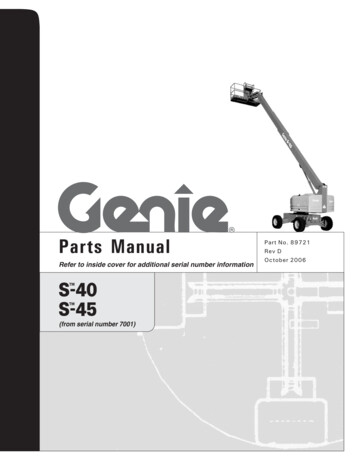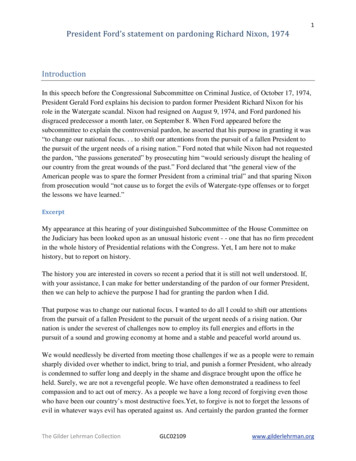
Transcription
President Ford’s statement on pardoning Richard Nixon, 19741IntroductionIn this speech before the Congressional Subcommittee on Criminal Justice, of October 17, 1974,President Gerald Ford explains his decision to pardon former President Richard Nixon for hisrole in the Watergate scandal. Nixon had resigned on August 9, 1974, and Ford pardoned hisdisgraced predecessor a month later, on September 8. When Ford appeared before thesubcommittee to explain the controversial pardon, he asserted that his purpose in granting it was“to change our national focus. . . to shift our attentions from the pursuit of a fallen President tothe pursuit of the urgent needs of a rising nation.” Ford noted that while Nixon had not requestedthe pardon, “the passions generated” by prosecuting him “would seriously disrupt the healing ofour country from the great wounds of the past.” Ford declared that “the general view of theAmerican people was to spare the former President from a criminal trial” and that sparing Nixonfrom prosecution would “not cause us to forget the evils of Watergate-type offenses or to forgetthe lessons we have learned.”ExcerptMy appearance at this hearing of your distinguished Subcommittee of the House Committee onthe Judiciary has been looked upon as an unusual historic event - - one that has no firm precedentin the whole history of Presidential relations with the Congress. Yet, I am here not to makehistory, but to report on history.The history you are interested in covers so recent a period that it is still not well understood. If,with your assistance, I can make for better understanding of the pardon of our former President,then we can help to achieve the purpose I had for granting the pardon when I did.That purpose was to change our national focus. I wanted to do all I could to shift our attentionsfrom the pursuit of a fallen President to the pursuit of the urgent needs of a rising nation. Ournation is under the severest of challenges now to employ its full energies and efforts in thepursuit of a sound and growing economy at home and a stable and peaceful world around us.We would needlessly be diverted from meeting those challenges if we as a people were to remainsharply divided over whether to indict, bring to trial, and punish a former President, who alreadyis condemned to suffer long and deeply in the shame and disgrace brought upon the office heheld. Surely, we are not a revengeful people. We have often demonstrated a readiness to feelcompassion and to act out of mercy. As a people we have a long record of forgiving even thosewho have been our country’s most destructive foes.Yet, to forgive is not to forget the lessons ofevil in whatever ways evil has operated against us. And certainly the pardon granted the formerThe Gilder Lehrman CollectionGLC02109www.gilderlehrman.org
President Ford’s statement on pardoning Richard Nixon, 19742President will not cause us to forget the evils of Watergate-type offenses or to forget the lessonswe have learned that a government which deceives its supporters and treats its opponents asenemies must never, never be tolerated.Questions for DiscussionTHE PROCLAMATION AND THE EXCERPT ARE APPROPRIATE FOR ALL LEVELS. BOTHDOCUMENTS IN THEIR ENTIRITY ARE APPROPRIATE FOR AP/IB LEVEL. IT IS SUGGESTED TOPRESENT BOTH DOCUMENTS TOGETHER.“Proclamation pardoning Richard Nixon, 1974” and “President Ford’s statement on pardoningRichard Nixon, 1974”Read the document introductions, the excerpts and the text. Then apply your knowledge ofAmerican history in order to answer the questions that follow. Answers to the questions may bedrawn from either or both documents.1. Why did President Ford believe it was necessary to pardon Richard Nixon?2. To what extent are you convinced by President Ford’s argument that Richard Nixon hadalready “paid the unprecedented penalty of relinquishing the highest elective office” anddeserved to be pardoned?3. Which of the statements by President Ford before the Congressional Committee weremost / least persuasive?4. Research the reaction of the news media to the pardon.The Gilder Lehrman CollectionGLC02109www.gilderlehrman.org
ImagePresident Ford’s statement on pardoning Richard Nixon, 19743Gerald Ford’s Statement before Subcommittee on Criminal Justice regardinghis pardon of Nixon, October 17, 1974. (Gilder Lehrman Collection, GLC02109)The Gilder Lehrman CollectionGLC02109www.gilderlehrman.org
President Ford’s statement on pardoning Richard Nixon, 19744TranscriptGerald Ford’s Statement before Subcommittee on Criminal Justice regarding his pardon of Nixon,October 17, 1974. (Gilder Lehrman Collection, GLC02109)FOR RELEASE UPON DELIVERYOctober 17, 1974Office of the White House Press -------------------------THE WHITE HOUSESTATEMENT BY THE PRESIDENTTO BE DELIVERED BEFORE SUBCOMMITTEE ON CRIMINAL JUSTICECOMMITTEE ON THE JUDICIARY,HOUSE OF REPRESENTATIVESGerald FordWe meet here today to review the facts and circumstances that were the basis for my pardon offormer President Nixon on September 8, 1974.I want very much to have those facts and circumstances known. The American people want toknow them. And members of the Congress want to know them. The two Congressional resolutions ofinquiry now before this Committee serve those purposes. That is why I have volunteered to appear beforeyou this morning, and I welcome and thank you for this opportunity to speak to the questions raised bythe resolutions.My appearance at this hearing of your distinguished Subcommittee of the House Committee onthe Judiciary has been looked upon as an unusual historic event – – one that has no firm precedent in thewhole history of Presidential relations with the Congress. Yet, I am here not to make history, but toreport on history.The history you are interested in covers so recent a period that it is still not well understood. If,with your assistance, I can make for better understanding of the pardon of ourThe Gilder Lehrman CollectionGLC02109www.gilderlehrman.org
President Ford’s statement on pardoning Richard Nixon, 19745former President, then we can help to achieve the purpose I had for granting the pardon when I did.That purpose was to change our national focus. I wanted to do all I could to shift our attentionsfrom the pursuit of a fallen President to the pursuit of the urgent needs of a rising nation. Our nation isunder the severest of challenges now to employ its full energies and efforts in the pursuit of a sound andgrowing economy at home and a stable and peaceful world around us.We would needlessly be diverted from meeting those challenges if we as a people were to remainsharply divided over whether to indict, bring to trial, and punish a former President, who already iscondemned to suffer long and deeply in the shame and disgrace brought upon the office he held. Surely,we are not a revengeful people. We have often demonstrated a readiness to feel compassion and to actout of mercy. As a people we have a long record of forgiving even those who have been our country’smost destructive foes.Yet, to forgive is not to forget the lessons of evil in whatever ways evil has operated against us.And certainly the pardon granted the former President will not cause us to forget the evils of Watergate–type offenses or to forget the lessons we have learned that a government which deceives its supportersand treats its opponents as enemies must never, never be tolerated.more(over)[2] The pardon power entrusted to the President under the Constitution of the United States has along history and rests on precedents going back centuries before our Constitution was drafted andadopted. The power has been used sometimes as Alexander Hamilton saw its purpose: “In seasons ofinsurrection when a well–timed offer of pardon to the insurgents or rebels may restore the tranquility ofthe commonwealth; and which, if suffered to pass unimproved, it may never be possible afterwards torecall.” 1/ Other times it has been applied to one person as “an act of grace which exempts theindividual, on whom it is bestowed, from the punishment the law inflicts for a crime he hascommitted.” 2/ When a pardon is granted, it also represents “the determination of the ultimate authoritythat the public welfare will be better1.The Federalist No. 74, at 79 (Central Law Journal ed. 1914) (A. Hamilton).2.Marshall, C.J., in United States v. Wilson, 32 U.S. (7 Pet.) 150, 160 (1833).The Gilder Lehrman CollectionGLC02109www.gilderlehrman.org
President Ford’s statement on pardoning Richard Nixon, 19746served by inflicting less than what the judgment fixed.” 3/ However, the Constitution does not limit thepardon power to cases of convicted offenders or even indicted offenders. 4/ Thus, I am firm in myconviction that as President I did have the authority to proclaim a pardon for the former President when Idid.Yet, I can also understand why people are moved to question my action. Some may still questionmy authority, but I find much of the disagreement turns on whether I should have acted when I did. Eventhen many people have concluded as I did that the pardon was in the best interests of the country becauseit came at a time when it would best serve the purpose I have stated.I come to this hearing in a spirit of cooperation to respond to your inquiries. I do so with theunderstanding that the subjects to be covered are defined and limited by the questions as they appear inthe resolutions before you. But even then we may not mutually agree on what information falls within theproper scope of inquiry by the Congress.I feel a responsibility as you do that each separate branch of our government must preserve adegree of confidentiality for its internal communications. Congress, for its part, has seen the wisdom ofassuring that members be permitted to work under conditions of confidentiality. Indeed, earlier this yearthe United States Senate passed a resolution which reads in part as follows:***“ no evidence under the control and in the possession of the Senate of the United States can, bythe mandate of process of the ordinary courts of justice, be taken from such control or possession,but by its permission.”(S. Res. 338, passed June 12, 1974)In United States v. Nixon, 42 U.S.L.W. 5237, 5244 (U.S. July 24, 1974), the Supreme Courtunanimously recognized a rightful sphere of confidentiality within the Executive Branch, which the Courtdetermined could only be invaded for overriding reasons of the Fifth and Sixth Amendments to theConstitution.3.Biddle v. Perovich, 247 U.S. 480, 486 (1927).4.Ex Parte Garland, 4 Wall. 333, 380 (1867); Burdick v. United States, 236 U.S. 79 (1915).The Gilder Lehrman CollectionGLC02109www.gilderlehrman.org
President Ford’s statement on pardoning Richard Nixon, 19747more[3] As I have stated before, my own view is that the right of Executive Privilege is to be exercisedwith caution and restraint. When I was a Member of Congress, I did not hesitate to question the right ofthe Executive Branch to claim a privilege against supplying information to the Congress if I thought theclaim of privilege was being abused. Yet, I did then, and I do now, respect the right of ExecutivePrivilege when it protects advice given to a President in the expectation that it will not be disclosed.Otherwise, no President could any longer count on receiving free and frank views from people designatedto help him reach his official decisions.Also, it is certainly not my intention or even within my authority to detract on this occasion or inany other instance from the generally recognized rights of the President to preserve the confidentiality ofinternal discussions or communications whenever it is properly within his Constitutional responsibility todo so. These rights are within the authority of any President while he is in office, and I believe may beexercised as well by a past President if the information sought pertains to his official functions when hewas serving in office.I bring up these important points before going into the balance of my statement, so there can beno doubt that I remain mindful of the rights of confidentiality which a President may and ought toexercise in appropriate situations. However, I do not regard my answers as I have prepared them forpurposes of this inquiry to be prejudicial to those rights in the present circumstances or to constitute aprecedent for responding to Congressional inquiries different in nature or scope or under differentcircumstances.Accordingly, I shall proceed to explain as fully as I can in my present answers the facts andcircumstances covered by the present resolutions of inquiry. I shall start with an explanation of theseevents which were the first to occur in the period covered by the inquiry, before I became President.Then I will respond to the separate questions as they are numbered in H. Res. 1367 and as theyspecifically relate to the period after I became President.H. Res. 1367* before this Subcommittee asks for information about certain conversations thatmay have occurred over a period that includes when I was a Member of Congress or the*Tab A attached.The Gilder Lehrman CollectionGLC02109www.gilderlehrman.org
President Ford’s statement on pardoning Richard Nixon, 19748Vice President. In that entire period no references or discussions on a possible pardon for then PresidentNixon occurred until August 1 and 2, 1974.You will recall that since the beginning of the Watergate investigations, I had consistently madestatements and speeches about President Nixon’s innocence of either planning the break–in or ofparticipating in the cover–up. I sincerely believed he was innocent.Even in the closing months before the President resigned, I made public statements that in myopinion the adverse revelations so far did not constitute an impeachable offense. I was coming underincreasing criticism for such public statements, but I still believed them to be true based on the facts as Iknew them.more[4] In the early morning of Thursday, August 1, 1974, I had a meeting in my Vice Presidentialoffice, with Alexander M. Haig, Jr., Chief of Staff for President Nixon. At this meeting, I was told in ageneral way about fears arising because of additional tape evidence scheduled for delivery to Judge Siricaon Monday, August 5, 1974. I was told that there could be evidence which, when disclosed to the Houseof Representatives, would likely tip the vote in favor of impeachment. However, I was given noindication that this development would lead to any change in President Nixon’s plans to oppose theimpeachment vote.Then shortly after noon, General Haig requested another appointment as promptly as possible.He came to my office about 3:30 P.M. for a meeting that was to last for approximately three–quarters ofan hour. Only then did I learn of the damaging nature of a conversation on June 23, 1972, in one of thetapes which was due to go to Judge Sirica the following Monday.I describe this meeting because at one point it did include references to a possible pardon for Mr.Nixon, to which the third and fourth questions in H. Res. 1367 are directed. However, nearly the entiremeeting covered other subjects, all dealing with the totally new situation resulting from the criticalevidence on the tape of June 23, 1972. General Haig told me he had been told of the new and damagingevidence by lawyers on the White House staff who had first–hand knowledge of what was on the tape.The substance of his conversation was that the new disclosure would be devastating, even catastrophic,insofar as President Nixon was concerned. Based on what he had learned of the conversation on the tape,he wanted to know whether I was prepared to assume the Presidency within a very short time, andwhether I would be willing to make recommendations to the President as to what course he should nowfollow.I cannot really express adequately in words how shocked and stunned I was by this unbelievablerevelation. First, was the sudden awareness I was likely to become President under these most troubledcircumstances; and secondly, the realization these new disclosures ran completely counter to the positionI had taken for months, in that I believed the President was not guilty of any impeachable offense.*Tab B attached.The Gilder Lehrman CollectionGLC02109www.gilderlehrman.org
President Ford’s statement on pardoning Richard Nixon, 19749General Haig in his conversation at my office went on to tell me of discussions in the WhiteHouse among those who knew of this new evidence.General Haig asked for my assessment of the whole situation. He wanted my thoughts about thetiming of a resignation, if that decision were to be made, and about how to do it and accomplish anorderly change of Administration. We discussed what scheduling problems there might be and what theearly organizational problems would be.General Haig outlined for me President Nixon’s situation as he saw it and the different views inthe White House as to the courses of action that might be available, and which were being advanced byvarious people around him on the White House staff. As I recall there were different major courses beingconsidered:(1) Some suggested “riding it out” by letting the impeachment take its course through the Houseand the Senate trial, fighting all the way against conviction.(2) Others were urging resignation sooner or later. I was told some people backed the first courseand other people a resignation but not with the same views as to how and when it should take place.On the resignation issue, there were put forth a number of options which General Haig reviewedwith me. As I recall his conversation, various possible options being considered included:more[5] (1) The President temporarily step aside under the 25th Amendment.(2) Delaying resignation until further along the impeachment process.(3) Trying first to settle for a censure vote as a means of avoiding either impeachment or a needto resign.(4) The question of whether the President could pardon himself.(5) Pardoning various Watergate defendants, then himself, followed by resignation.(6) A pardon to the President, should he resign.The rush of events placed an urgency on what was to be done. It became even more critical inview of a prolonged impeachment trial which was expected to last possibly four months or longer.The impact of the Senate trial on the country, the handling of possible international crises, theeconomic situation here at home, and the marked slowdown in the decision–making process within thefederal government were all factors to be considered, and were discussed.*Tab B attached.The Gilder Lehrman CollectionGLC02109www.gilderlehrman.org
President Ford’s statement on pardoning Richard Nixon, 197410General Haig wanted my views on the various courses of action as well as my attitude on theoptions of resignation. However, he indicated he was not advocating any of the options. I inquired as towhat was the President’s pardon power, and he answered that it was his understanding from a WhiteHouse lawyer that a President did have the authority to grant a pardon even before any criminal actionhad been taken against an individual, but obviously, he was in no position to have any opinion on a matterof law.As I saw it, at this point the question clearly before me was, under the circumstances, what courseof action should I recommend that would be in the best interest of the country.I told General Haig I had to have time to think. Further, that I wanted to talk to James St. Clair. Ialso said I wanted to talk to my wife before giving any response. I had consistently and firmly held theview previously that in no way whatsoever could I recommend either publicly or privately any step by thePresident that might cause a change in my status as Vice President. As the person who would becomePresident if a vacancy occurred for any reason in that office, a Vice President, I believed, should endeavornot to do or say anything which might affect his President’s tenure in office. Therefore, I certainly wasnot ready even under these new circumstances to make any recommendations about resignation withouthaving adequate time to consider further what I should properly do.Shortly after 8:00 o’clock the next morning James St. Clair came to my office. Although he didnot spell out in detail the new evidence, there was no question in my mind that he considered theserevelations to be so damaging that impeachment in the House was a certainty and conviction in the Senatea high probability. When I asked Mr. St. Clair if he knew of any other new and damaging evidencebesides that on the June 23, 1972, tape, he said “no.” When I pointed out to him the various optionsmentioned to me by General Haig, he told me he had not been the source of any opinion aboutPresidential pardon power.more[6] After further thought on the matter, I was determined not to make any recommendations toPresident Nixon on his resignation. I had not given any advice or recommendations in my conversationswith his aides, but I also did not want anyone who might talk to the President to suggest that I had someintention to do so.For that reason I decided I should call General Haig the afternoon of August 2nd. I did make thecall late that afternoon and told him I wanted him to understand that I had no intention of recommendingwhat President Nixon should do about resigning or not resigning, and that nothing we had talked aboutthe previous afternoon should be given any consideration in whatever decision the President might make.General Haig told me he was in full agreement with this position.My travel schedule called for me to make appearances in Mississippi and Louisiana overSaturday, Sunday, and part of Monday, August 3, 4, and 5. In the previous eight months, I had repeatedly*Tab B attached.The Gilder Lehrman CollectionGLC02109www.gilderlehrman.org
President Ford’s statement on pardoning Richard Nixon, 197411stated my opinion that the President would not be found guilty of an impeachable offense. Any changefrom my stated views, or even refusal to comment further, I feared, would lead in the press to conclusionsthat I now wanted to see the President resign to avoid an impeachment vote in the House and probableconviction vote in the Senate. For that reason I remained firm in my answers to press questions duringmy trip and repeated my belief in the President’s innocence of an impeachable offense. Not until Ireturned to Washington did I learn that President Nixon was to release the new evidence late on Monday,August 5, 1974.At about the same time I was notified that the President had called a Cabinet meeting for Tuesdaymorning, August 6, 1974. At that meeting in the Cabinet Room, I announced that I was making norecommendations to the President as to what he should do in the light of the new evidence. And I madeno recommendations to him either at the meeting or at any time after that.In summary, I assure you that there never was at any time any agreement whatsoever concerninga pardon to Mr. Nixon if he were to resign and I were to become President.The first question of H. Res. 1367 asks whether I or my representative had “specific knowledgeof any formal criminal charges pending against Richard M. Nixon.” The answer is: “no.”I had known, of course, that the Grand Jury investigating the Watergate break–in and cover–uphad wanted to name President Nixon as an unindicted co–conspirator in the cover–up. Also, I knew thatan extensive report had been prepared by the Watergate Special Prosecution Force for the Grand Jury andhad been sent to the House Committee on the Judiciary, where, I believe, it served the staff and membersof the Committee in the development of its report on the proposed articles of impeachment. Beyond whatwas disclosed in the publications of the Judiciary Committee on the subject and additional evidencereleased by President Nixon on August 5, 1974, I saw on or shortly after September 4th a copy of amemorandum prepared for Special Prosecutor Jaworski by the Deputy Special Prosecutor, Henry Ruth.*Copy of this memorandum had been furnished by Mr. Jaworski to my Counsel and was later made publicduring a press briefing at the White House on September 10, 1974.more[7] I have supplied the Subcommittee with a copy of this memorandum. The memorandum listsmatters still under investigation which “may prove to have some direct connection to activities in whichMr. Nixon is personally involved.” The Watergate cover–up is*Tab B attached.The Gilder Lehrman CollectionGLC02109www.gilderlehrman.org
President Ford’s statement on pardoning Richard Nixon, 197412not included in this list; and the alleged cover-up is mentioned only as being the subject of a separatememorandum not furnished to me. Of those matters which are listed in the memorandum, it is stated thatnone of them “at the moment rises to the level of our ability to prove even a probable criminal violationby Mr. Nixon.”This is all the information I had which related even to the possibility of “formal criminal charges”involving the former President while he had been in office.The second question in the resolution asks whether Alexander Haig referred to or discussed apardon with Richard M. Nixon or his representatives at any time during the week of August 4, 1974, orany subsequent time. My answer to that question is: not to my knowledge. If any such discussions didoccur, they could not have been a factor in my decision to grant the pardon when I did because I was notaware of them.Questions three and four of H. Res. 1367 deal with the first and all subsequent references to, ordiscussions of, a pardon for Richard M. Nixon, with him or any of his representatives or aides. I havealready described at length what discussions took place on August 1 and 2, 1974, and how thesediscussions brought no recommendations or commitments whatsoever on my part. These were the onlydiscussions related to questions three and four before I became President, but question four relates also tosubsequent discussions.At no time after I became President on August 9, 1974, was the subject of a pardon for RichardM. Nixon raised by the former President or by anyone representing him. Also, no one on my staffbrought up the subject until the day before my first press conference on August 28, 1974. At that time, Iwas advised that questions on the subject might be raised by media reporters at the press conference.As the press conference proceeded, the first question asked involved the subject, as did other laterquestions. In my answers to these questions, I took a position that, while I was the final authority on thismatter, I expected to make no commitment one way or the other depending on what the SpecialProsecutor and courts would do. However, I also stated that I believed the general view of the Americanpeople was to spare the former President from a criminal trial.more[8] Shortly afterwards I became greatly concerned that if Mr. Nixon’s prosecution and trial wereprolonged, the passions generated over a long period of time would seriously disrupt the healing of ourcountry from the wounds of the past. I could see that the new Administration could not be effective if ithad to operate in the atmosphere of having a former President under prosecution and criminal trial. Eachstep along the way, I was deeply concerned, would become a public spectacle and the topic of wide publicdebate and controversy.The Gilder Lehrman CollectionGLC02109www.gilderlehrman.org
President Ford’s statement on pardoning Richard Nixon, 197413As I have before stated publicly, these concerns led me to ask from my own legal counsel whatmy full right of pardon was under the Constitution in this situation and from the Special Prosecutor whatcriminal actions, if any, were likely to be brought against the former President, and how long hisprosecution and trial would take.As soon as I had been given this information, I authorized my Counsel, Philip Buchen, to tellHerbert J. Miller, as attorney for Richard M. Nixon, of my pending decision to grant a pardon for theformer President. I was advised that the disclosure was made on September 4, 1974, when Mr. Buchen,accompanied by Benton Becker, met with Mr. Miller. Mr. Becker had been asked, with my concurrence,to take on a temporary special assignment to assist Mr. Buchen, at a time when no one else of myselection had yet been appointed to the legal staff of the White House.The fourth question in the resolution also asks about “negotiations” with Mr. Nixon or hisrepresentatives on the subject of a pardon for the former President. The pardon under consideration wasnot, so far as I was concerned, a matter of negotiation. I realized that unless Mr. Nixon actually acceptedthe pardon I was preparing to grant, it probably would not be effective. So I certainly had no intention toproceed without knowing if it would be accepted. Otherwise, I put no conditions on my granting of apardon which required any negotiations.The Gilder Lehrman CollectionGLC02109www.gilderlehrman.org
President Ford’s statement on pardoning Richard Nixon, 197414Although negotiations had been started earlier and were conducted through September 6thconcerning White House records of the prior administration, I did not make any agreement on that subjecta condition of the pardon. The circumstances leading to an initial agreement on Presidential records arenot covered by the Resolutions before this Subcommittee. Therefore, I have mentioned discussions onthat subject with Mr. Nixon’s attorney only to show they were related in time to the pardon discussionsbut were not a basis for my decision to grant a pardon to the former President.The fith, sixth, and seventh question of H. Res. 1367 ask whether I consulted with certain personsbefore making my pardon decision.I did not consult at all with Attorney General
President Ford's statement on pardoning Richard Nixon, 1974 . The Gilder Lehrman Collection GLC02109 www.gilderlehrman.org . Transcript . Gerald Ford's Statement before Subcommittee on Criminal Justice regarding his pardon of Nixon, October 17, 1 974. (Gilder Lehrman Collection, GLC02109) FOR RELEASE UPON DELIVERY October 17, 1974
